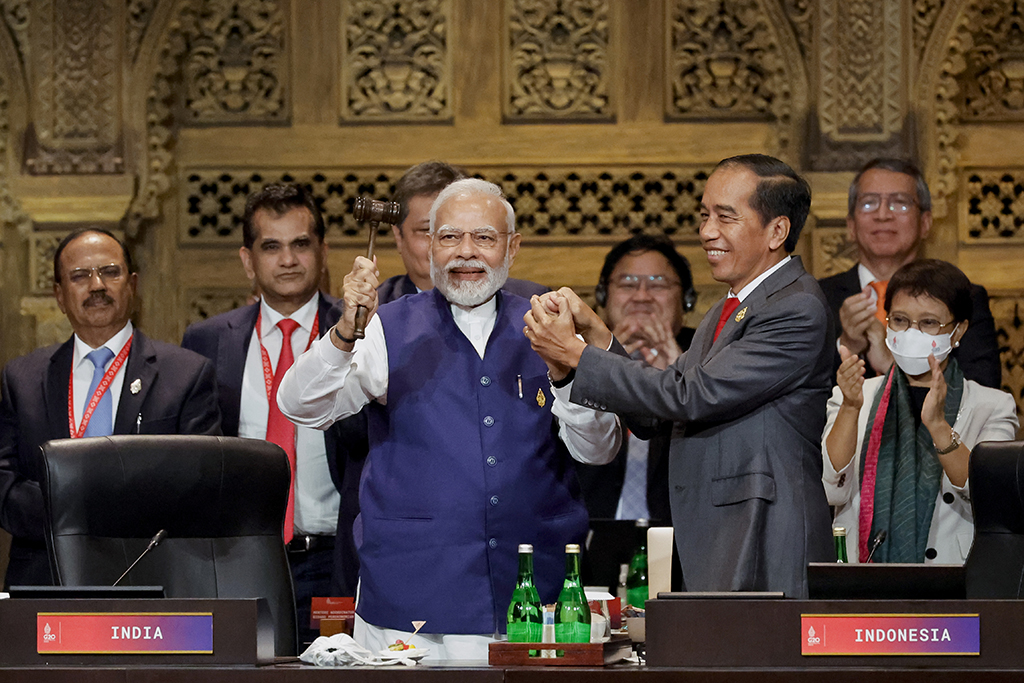NUSA DUA, Indonesia: G20 nations on Wednesday said the war in Ukraine was hurting the global economy and warned against the threat or use of nuclear weapons in the conflict, according to a final statement agreed on by leaders. After a two-day summit in Bali, “most” of the world’s 20 biggest economies also condemned the war in Ukraine, which threatened to escalate after two people were killed in a missile strike on Polish territory.
Earlier, Indonesia’s president said Wednesday that negotiations for a joint G20 summit declaration were extremely difficult, but hailed the leaders’ agreement. President Joko Widodo hosted two days of talks on the resort island of Bali that were overshadowed by the war in Ukraine, before passing the baton to next year’s host: India. “The discussion was very very tough but eventually the leaders agreed on the content of the declaration which is the condemnation of the war in Ukraine because it has violated the borders, the integrity of the region,” he told a closing press conference.
“It has caused misery for people and worsened the global economy.” The document said “most members strongly condemned the war” and called for the extension of a deal with Russia that allows the export of Ukrainian grain.
The Indonesian leader said the most debated paragraph in the declaration’s text was the one focused on Moscow’s war in Ukraine. “Until midnight, we talked about this, and finally the Bali declaration was reached by consensus,” he said. “We agreed that war has an impact on the global economy. The global economy will not be achieved without peace. Therefore, I said, the war must be stopped.”
Widodo handed over the G20 chair to New Delhi, which maintains strong economic ties with Moscow, at a ceremony with Indian Prime Minister Narendra Modi on Wednesday. Meanwhile, Indonesia has proposed the establishment of a bloc of the world’s top nickel producers similar to the oil cartel OPEC in talks with Canada, its investment minister said. The Southeast Asian nation is the world’s top nickel producer, while Canada is also a major producer of the mineral, according to United States Geological Survey data.
“Through such collaboration, we hope all nickel-producing countries will be able to profit through a fair added value creation,” Bahlil Lahadalia said, according to a ministry statement. The proposal was raised when Lahadalia met Canada’s trade minister Mary Ng on the sidelines of the G20 summit in Bali.
He said an organization similar to OPEC, a group of 13 oil-producing countries, could help organize and streamline policies on nickel, a key mineral used to make batteries—including for electric vehicles, stainless steel and mobile phones. Lahadalia previously floated the idea of such a grouping in an interview with the Financial Times in October, saying at the time that Indonesia was still formulating the group’s structure. Ng said in the statement that the two countries could explore the collaboration proposal, adding that Indonesia and Canada shared a similar vision for optimizing their resources in a sustainable way.
Indonesia has banned exports of raw nickel ore since 2020 in a move to encourage investments in downstream industries in the country, which also sparked a trade dispute with the European Union. The Indonesian government has touted plans to turn the country into an electric-vehicle hub. Nickel is used in lithium batteries that power petrol-free cars. It has attracted investment from some foreign firms in nickel-battery processing plants, including China’s Tsingshan Holding Group. – AFP











